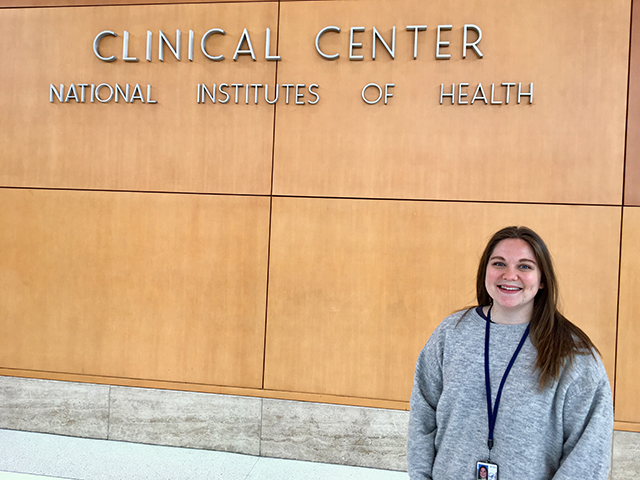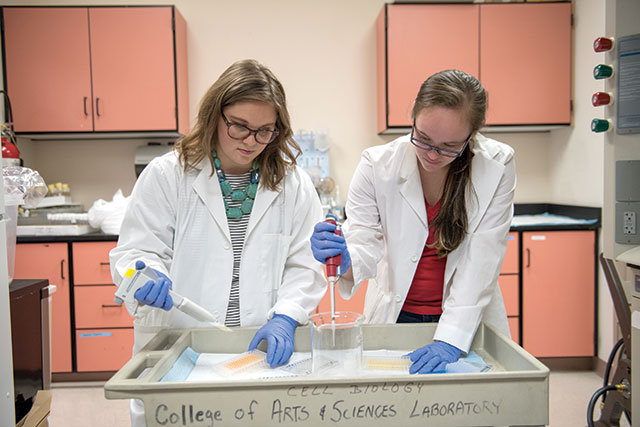Xylia Horgan says she decided to take a year and a half “off” after earning her bachelor’s degree from FGCU in December. But she’s not following the well-trod path of college graduates backpacking through Europe, and she’s not lounging around her parents’ house contemplating her future, either.
A summa cum laude graduate in biology with plans to practice pediatric oncology, Horgan is spending her so-called “off” time immersed in research at the National Institutes of Health (NIH) — the nation’s biomedical research institution — in Bethesda, Md.

Through the NIH’s Postbaccalaureate Intramural Research Training Award, this highly motivated alumna is working with a post-doc researcher in an immunology lab to advance knowledge of the hepatitis-delta virus, a little-known “superinfection” for which no effective treatment exists. When she finishes in July 2020, she will have gained valuable experience in translational research – “bench-to-bedside” work trying to answer questions in the laboratory that can be implemented in the clinical arena to benefit patients, she says.
“I knew I wanted to go to medical school in my first semester. What I didn’t know was that research was going to become a major part of my path as I became extremely involved in breast cancer research with Dr. Lyndsay Rhodes,” Horgan says. “Knowing that I wanted to stay on the clinical side of medicine, I continued to purse an M.D. path. However, I saw the great connection to medicine and research and knew that I wanted to have more experience with research before starting medical school.”
The Naples native is believed to be the first FGCU grad to be awarded a highly selective NIH research fellowship, but those familiar with her undergraduate career likely would not be surprised. Horgan was just a sophomore when she began working with Rhodes, who calls her “an inspiration to me and to her peers.”
“Xylia is amazingly talented and driven for a person at her stage in life,” Rhodes says. “She has a drive to understand that propelled her through her undergraduate education. She led several of my research projects and coordinated team members with amazing efficiency and confidence. In the summer between her junior and senior year she was selected for a highly competitive research fellowship. As an undergraduate, she wrote and submitted a peer-reviewed research article on her work that has recently been accepted for publication. Not many students could accomplish that at any university. All of her experience and determination truly shows through with her acceptance into the National Institutes of Health fellowship.”
Horgan was a model of student engagement at FGCU: active in the Honors College; founding member and former president of the FGCU Cancer Research Program; co-creator of a biology-based program called “Demystifying Cancer” that has been presented at Lee County high schools; teaching assistant for the Girls in Engineering, Math and Science program that encourages middle-school girls explore those fields; Alumni Association ambassador and presenter in FGCU’s first Research Roadshow. The summer before she graduated, Horgan completed a research internship at St. Jude Children’s Research Hospital in Memphis.
All of this probably contributed to Horgan’s selection by the NIH, which has about a 15% acceptance rate, she says.
“The mentorship, research experience and opportunities I received during my time at FGCU gave me the foundation to do things I never imagined I would be able to do,” Horgan says. “Getting involved in research early gave me skills that made me a competitive applicant for a summer research internship at St. Jude. This experience was vital to not only expand my research experience but also help fuel my desire to go into pediatric oncology. The more immunology-focused research I did at St. Jude made me a good fit in the immunology lab I am now working in.”
Housed within the National Institute of Diabetes and Digestive and Kidney Diseases branch of the NIH, the lab’s focus is studying hepatitis viral infections as well as some other liver-related diseases.
Horgan credits the mentorship she received at FGCU under Rhodes and Dr. Daniel Paull in the chemistry department for helping her find her passion and for nurturing her growth as a young scientist.
“Without the amazing dedication shown by some incredible faculty at FGCU, my undergraduate experience would have looked much different,” she says. “I did not set out to do cancer research or even have it be anything beyond something to put on my CV. However, I have come to love the process and am incredibly grateful to have had the chance to discover that passion at FGCU.”
That fervor probably helped convince the officials who interviewed her, but Horgan is certain her undergraduate research experience gave her an edge over other applicants in the highly competitive, federally funded NIH program. She encourages any FGCU student who might be interested in research to pursue the opportunities the university prides itself on providing.
“The benefit of doing research while an undergrad is that you can get a good taste of what research is like and see if it is really something you want to do in the future,” Horgan says. “Even if research doesn’t turn out to be your thing, you will learn skills that will stick with you and be useful for other aspects of your life. The same is true for getting involved in any other activity outside the classroom. Undergrad is an incredible time to find out what you are passionate about.”
